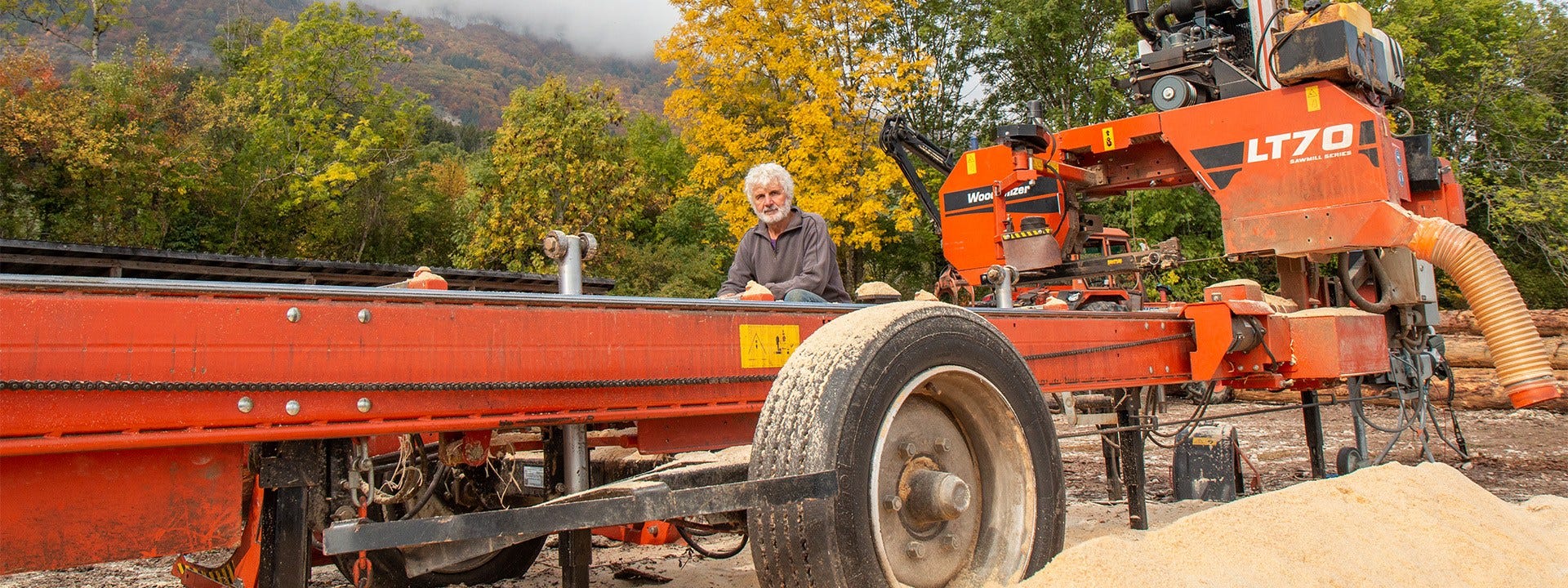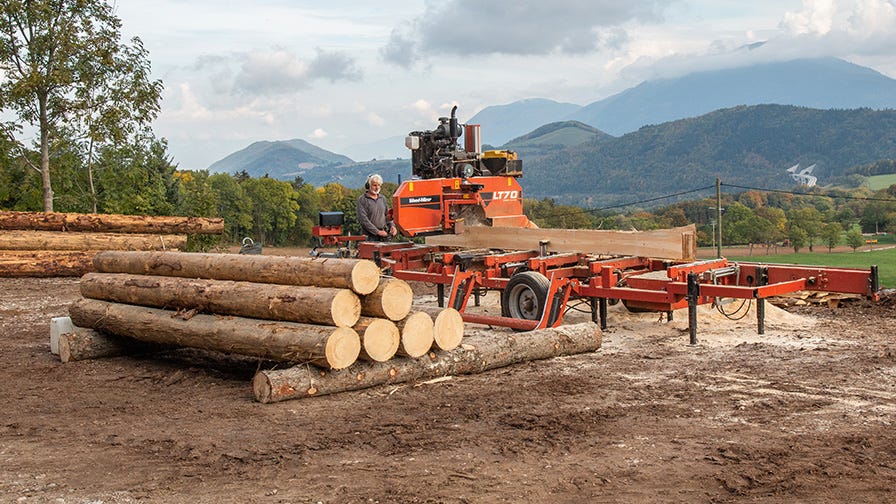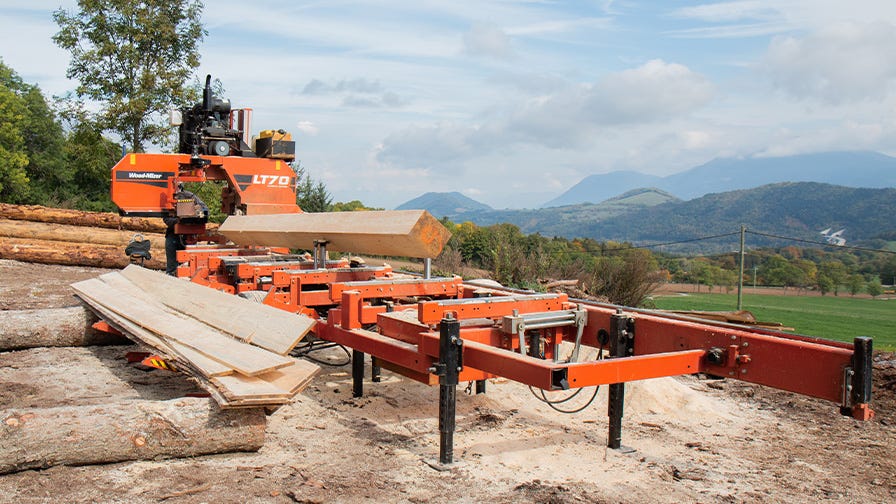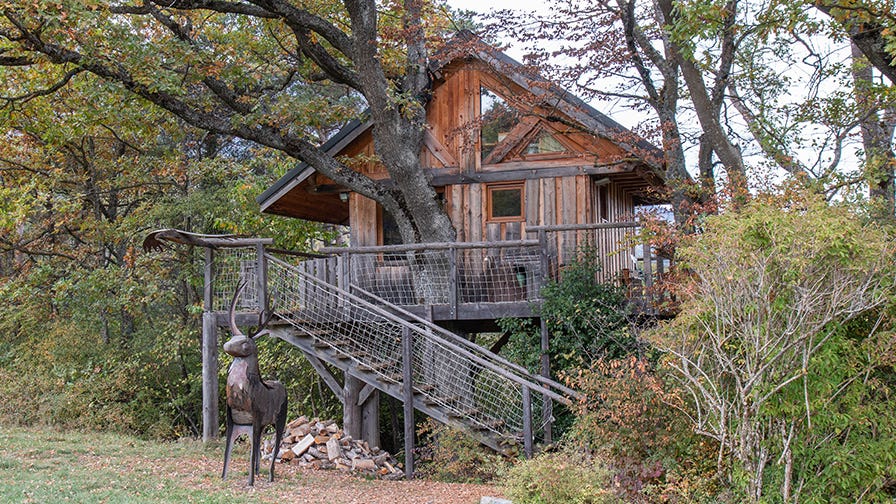Sawmilling in the French Alps with a Wood-Mizer LT70 Mobile Sawmill
By Marcin Kozłowski, PR Specialist

What is the best sawmill for working in mountainous areas? Sawmilling in the Alps requires much character and determination from the local sawmillers. Towing sawmills up mountainous roads can be challenging, even for the most experienced sawmillers. Apart from the skills and practical knowledge about wood, they also need the proper sawmilling equipment to do their job well.
Xavier Poulat from the Trièves mountains region claims the best sawmill he has ever had is the Wood-Mizer LT70 mobile sawmill with full hydraulics and a wireless control unit. He knows from experience, as his LT70 sawmill is the fifth Wood-Mizer machine he has used in his sawmilling career.




There is much need for contract sawmilling services in Monestier-de-Clermont, a small village in the Trièves mountains, a range of the French Alps. The people here need good quality timber to build houses, maintain farms, or make original furniture. They realize they are blessed with abundant forests and prefer that the wood be sourced locally and stay in the local economy. The local village people strongly believe trees are a gift from Nature that shouldn’t be wasted.
“I have often seen beautiful hardwoods cut down and sold as firewood. I felt bad about it because I realized this wood deserved much more. It could have been used in joinery, cabinetmaking, or carpentry. As soon as I found the right sawmill for my business, I knew it was my mission to salvage the local wood and allow people around to benefit from it. Today I try to work only with locally-grown trees and process them for the local community,” explains Xavier Poulat, a sawmiller with more than 26 years of experience working with the Wood-Mizer LT70 sawmill.






Xavier was born into a family of farmers with a solid connection to the land and forest. His father’s dream was to see him work on a farm, although Xavier decided to become a sawmiller. “Before I started my business, I had worked for 15 years in forestry, learning from my two lumberjack brothers. In 1994 during a forestry show, I saw a mobile sawmill for the first time, and I was completely amazed at that idea. I immediately contacted the Wood-Mizer representative and signed the purchase order later that day,” recalls Xavier.
Xavier’s beginnings in the sawmilling business were full of passion and involvement, as he had no difficulty finding customers for his services. Learning to operate a sawmill was relatively easy, although he needed to develop the proper blade maintenance technique. “Back in the day, it was challenging to sharpen and set the sawmill blade. Today, sawmill blades are more efficient, as I maintain them on my own with the Wood-Mizer sharpening equipment. Sawmillers can easily operate and adjust a Wood-Mizer sawmill, even if they know little about general mechanics,” affirms Xavier.




Xavier operates the Wood-Mizer LT70 sawmill and admits it is the fifth Wood-Mizer sawmill in his career and by far the best one. Over the years, all his Wood-Mizer machines have been good value-for-money products as they have always been sturdy and reliable. “I’ve been following the development of Wood-Mizer machines ever since the company appeared on the French market. I upgrade my sawmills every 4-5 years as new improvements appear in the machines. I started with a gasoline LT40 sawmill, then I changed to a diesel LT40 sawmill, and for the past few years, it has been only the LT70 sawmill. This is my third LT70 sawmill in a row,” says Xavier.
The LT70 mobile sawmill is a perfect choice for sawmillers who deal with a high capacity of wood and need a quick production time. Xavier’s LT70 sawmill is a portable machine, allowing him to travel around for contract sawmilling services. Now he can’t imagine work without the hydraulic functions of the sawmill bed, which include vertical side supports, a dual-rod central log clamp, and chain log turners. To extend the sawmill blade’s lifetime, he also uses a debarker. Above all, Xavier appreciates the wireless controller for the convenient operation of the machine, regardless of the weather conditions. “Compared to my previous LT40 sawmill, the LT70 works faster and offers a higher sawing capacity. I can now rotate large or crooked logs with the fully hydraulic bed functions. In addition, I have all the controls linked to the wireless operator unit, with which I can walk around the sawmill and find the best position for myself. All these LT70 functions have improved my workstyle, " Xavier points out.






Xavier enjoys working for local customers within a 100 km radius, supplying them with locally sourced timber products. He is recognized for his flexibility, as he can tow his LT70 mobile sawmill to nearly every place appointed by the customer and do all sorts of sawmilling wonders. “People appreciate that I can come to their site with the machine and do all the work for them. I can supply them with boards, cants, and roof beams. In my career, I have sawn all possible kinds of wood, including softwood, hardwood, poplar, chestnut, etc. I have never complained about lack of work – I process around 1000 cubic meters of wood a year,” he shares.
“I work with self-builders who know how to organize the work to make it efficient. They use tractors to pile the logs near the sawmilling site before I arrive, take off freshly sawn boards from the log while cutting, and finally put them away on the stack. My customers often ask me for 6,5 m wide timber frames used in house construction, but earlier I would make even larger frames for them. With my first LT70 sawmill on an 8,5-m-long bed, I used to go to various ski resorts for sawmilling contracts, facing the challenge of towing a nearly 3-ton machine with low clearance on muddy, mountainous trails. These days I work only on a 6,5-m-long sawmill bed which is a good compromise between capacity and portability.”




***
